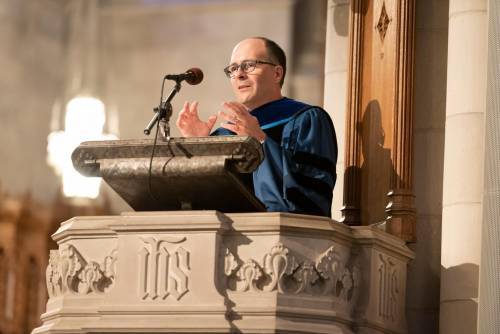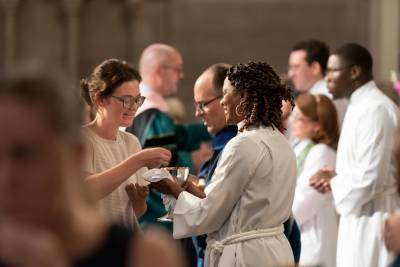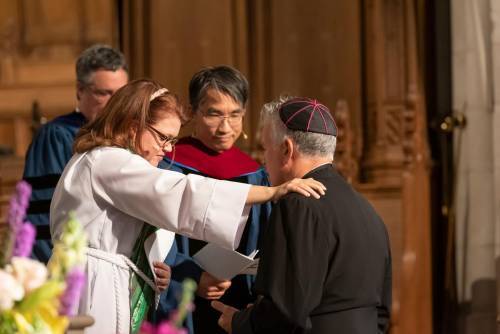
At Duke Divinity School’s 97th Opening Convocation, Divinity School Dean Edgardo Colón-Emeric marked the moment as one in which the school approaches “a season of centennials” during a time of ecclesial upheaval in the U.S. “The confluence of centennials and upheavals is not a perfect storm but a perfect opportunity to embrace a Pentecost pedagogy to become more fully what we already are, a Pentecost people,” he said.
While Duke University will celebrate its centennial in 2024 and Duke Divinity School will celebrate its in 2026, the Office of Black Church Studies recently celebrated its 50th anniversary, and the Hispanic House of Studies will celebrate its Quinceañera this year.
The Opening Convocation service, which marks the beginning of the new academic year, also serves as a welcome to entering students, who this year included 215 students from 35 U.S. states and the District of Columbia as well as new community members who hold either primary or secondary citizenship in 16 other countries including Canada, Chile, China, Finland, Germany, India, Kenya, Mexico, Nigeria, Peru, Russia, Saint Kitts and Nevis, South Korea, Sri Lanka, Syria, and Zimbabwe.

The Master of Divinity program gained 104 new students, including 54 residential students and 50 in the hybrid program (up from 42 the year before). The Master of Arts in Christian Practice enrolled 13 new students; the Doctor of Ministry, 22; Master of Theology, 11; Master of Theological Studies, 29; the Doctor of Theology welcomed five new students to campus. The Certificate in Theology and Health Care welcomed 11 residential students to campus and 15 in the hybrid program. Five special students also enrolled.
Across all programs at the Divinity School, 31 percent of incoming students reported one or more racial/ethnic identities underrepresented in our community, with Black students making up 21 percent and Latinx students, 7 percent. Female-identifying students make up 54 percent of incoming students, while male-identifying students comprise 46 percent.
Of the 104 new M.Div. students, 26 percent reported one or more racial/ethnic identities underrepresented in our community, with Black students making up 16 percent and Latinx students, 8 percent. Female-identifying students make up 51 percent of incoming M.Div. students, while male-identifying students make up 49 percent.
There were 25 denominations represented in the M.Div. entering class, with 26 percent affiliated with the United Methodist Church. Baptist students make up 10 percent of the incoming students; Anglican or Episcopalian students, 11 percent; Presbyterian or Reformed tradition students, 6 percent; and nondenominational students, 12 percent.
